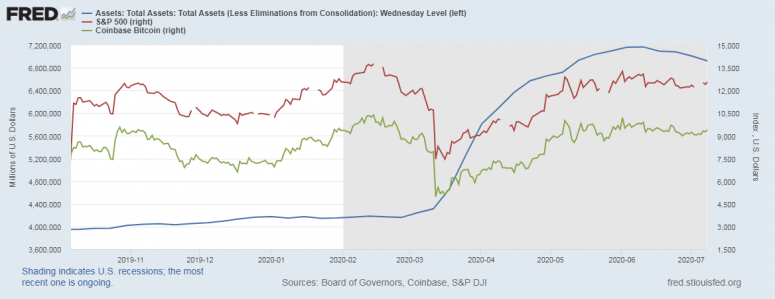The Federal Reserve’s Declining Balance Sheet Is Bearish for Bitcoin. Or Is It? – CoinDesk
The U.S. Federal Reserve’s balance sheet is contracting, but despite popular opinion that’s not necessarily bad news for bitcoin.
The central bank’s balance sheet declined by $88 billion to $6.97 trillion (-1.5%) in the week ending July 8, having hit a record high of $7.16 trillion in early June, according to the data source Federal Reserve Bank of St. Louis. The decline is the largest in 11 years.
The drop is a sign of the Fed starting to unwind the liquidity-boosting measures rolled out over the past four months to counter the economic effects of the coronavirus crisis. Some have anticipated a pullback in bitcoin prices as a result.
That’s because the leading cryptocurrency by market value has recently developed a relatively strong positive correlation with the S&P 500. And Wall Street’s equity index has rallied by over 40% since a slump in March, largely on the back of Fed’s balance sheet expansion.

As such, a contracting balance sheet could portend a pullback in stocks, and perhaps bitcoin.
However, zooming into the details of the Fed’s balance sheet reveals the reduction has been primarily driven by a drop in demand for emergency liquidity measures, a sign the coronavirus-induced stress in the financial system has eased.
“Less emergency funding being used is a healthy sign,” said Richard Rosenblum, co-founder of GSR. “Markets might not be able to stand completely on their own two feet, but they are at least a bit further from code red emergency mode.”
Goldilocks scenario?
Notably, dollar swap lines – reciprocal agreements between central banks to keep currency available for their commercial banks – have fallen by over $40 billion, as noted by Lyn Alden, founder of Lyn Alden Investment Strategy.
The Fed opened dollar swap lines with other central banks after the coronavirus crash caused a dollar shortage in the international markets. Therefore, the latest decline in the dollar swap lines could be considered good news.
Meanwhile, the balance of outstanding repurchase agreements, or repos, slipped to zero from $61.2 billion seen in the week ended July 1. Repos are a source of short-term funding for commercial banks. The Fed began injecting liquidity in the repo market in mid-September 2019 and ramped up the effort following the market crisis in March.
As such, the decline in repos to zero indicates that the coronavirus-induced stress in the funding markets has eased significantly.
However, the Fed is still injecting liquidity into the U.S. economy via purchases of U.S. treasuries at a faster pace. The central bank accumulated treasuries worth $18 billion during the past week, pushing the overall bond holdings to a new high of $4.23 trillion.
All in all, the Fed’s balance sheet contraction and drop in repos and swap lines appear indicative of a Goldilocks scenario for equities, given the ongoing crisis at least, and seems unlikely to pose a threat to bitcoin’s price.
The cryptocurrency would still face stronger selling pressure if stocks once more collapse on adverse coronavirus news. But the market is still showing resilience with a measured drop, even though U.S. registered 65,551 new coronavirus cases on Thursday, a new daily record, according to John Hopkins University.
At press time, futures tied to the S&P 500 are reporting a 0.33% decline, while bitcoin is changing hands near $9,170, having faced rejection above $9,400 on Thursday.
Disclosure: The author holds no cryptocurrency assets at the time of writing.
Disclosure
The leader in blockchain news, CoinDesk is a media outlet that strives for the highest journalistic standards and abides by a strict set of editorial policies. CoinDesk is an independent operating subsidiary of Digital Currency Group, which invests in cryptocurrencies and blockchain startups.





